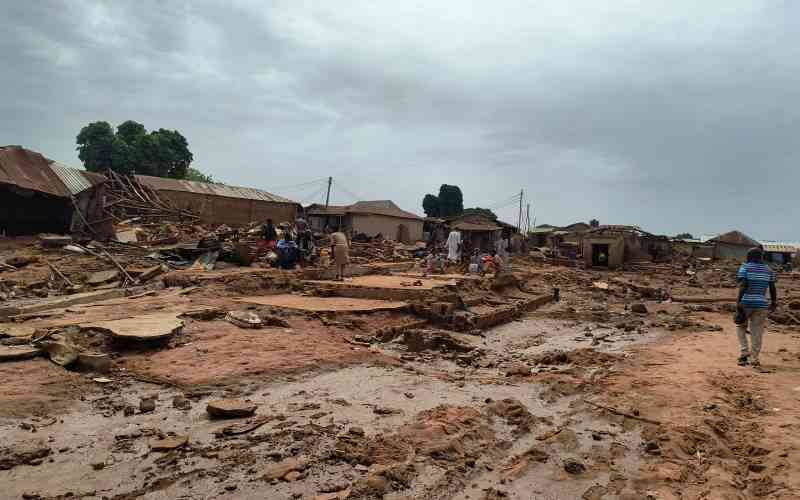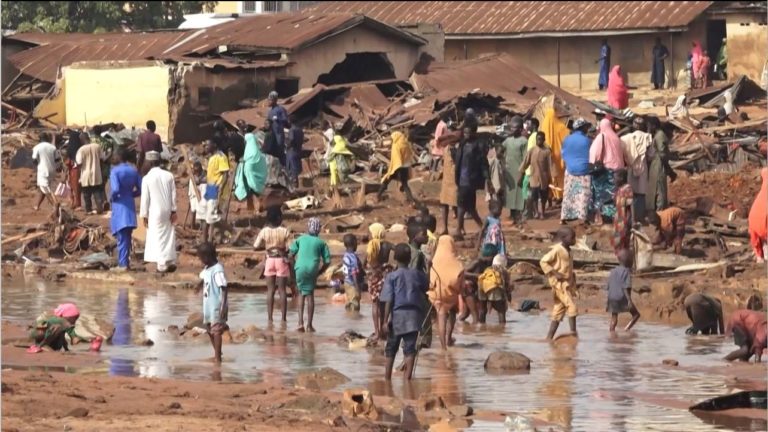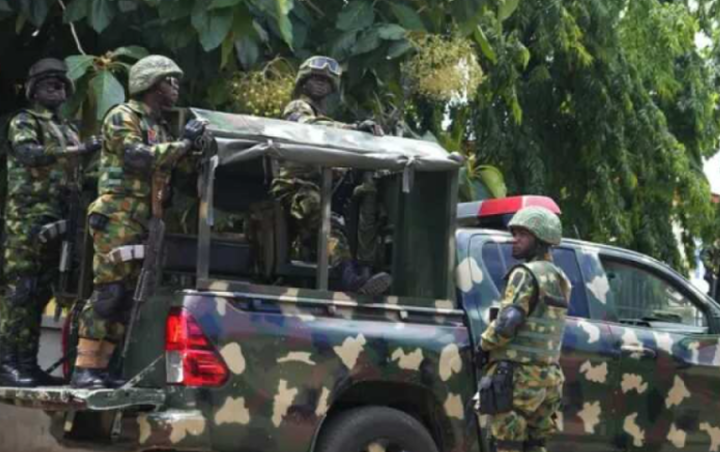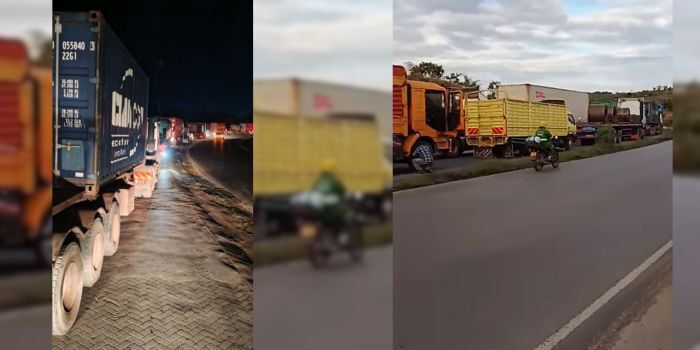Devastating Floods in Mokwa, Nigeria: Hundreds Dead, Many Missing

The town of Mokwa in Mokwa Local Government Area of Niger State has been struck by a catastrophic flood, described as the worst in the area in 60 years. The disaster, which unfolded after late-night torrential rains last Wednesday, primarily affected the Mokwa districts of Tiffin Maza and Anguwan Hausawa, leading to widespread devastation and hundreds of houses destroyed.
The human toll of the disaster is staggering. According to Niger State Deputy Governor Yakubu Garba, the death toll has tragically risen to 200, with over 1,000 people still missing. The floods have also displaced more than 3,000 individuals and affected over 2,000 houses, leaving a profound impact on the community. Earlier reports from the British Broadcasting Corporation (BBC) had indicated a death toll of over 200 with more than 500 missing, noting that victims included women and children, among them many pupils of Quranic schools.
Residents recounted harrowing experiences of loss and survival. Adamu Yusuf shared the heartbreaking story of losing his wife and newborn baby, stating, “I watched helplessly as water washed away my family. I survived because I could swim.” Saliu Sulaiman described being left homeless and losing business profits amounting to at least $1,500 from the sale of farm produce. Farida Auwalu tragically became the lone survivor from a family of 16, having lost seven children in the deluge; the bodies of four have since been found and buried. She expressed her hope to find the remaining bodies for a decent burial and closure. Another local fisherman, Danjuma Shaba, reported his house had collapsed, leaving him without shelter.
Rescue efforts have reportedly ceased, as authorities, according to local official Musa Kimboku, no longer believe anyone could still be found alive. The district head of Mokwa, Muhammadu Aliyu, indicated that authorities would commence digging out corpses buried underground to prevent the outbreak of diseases. He also mentioned that some bodies were unrecoverable as they had been swept "through the River Niger." Residents claimed the flood's devastation was exacerbated by a nearby dam bursting, a claim yet to be confirmed by authorities. The force of the floodwater was reportedly so intense that bodies were washed up in Rabba, a town an hour’s drive from Mokwa. Musa Kimboku also told the BBC that neighbouring villages had been instructed to bury "any corpse that they find."
Survivors of the flood are facing immense hardship with limited aid. Hassan Umar, a resident, told Al Jazeera that "No one brought any money or food to help the victims. As you can see, many don’t have a place to sleep." Alhaji Tanko Bala, leader of the Hausa community in Mokwa, reported that most affected victims were sleeping in open spaces due to inadequate government provisions for shelter. He noted that the primary school designated as a camp for Internally Displaced Persons (IDPs) was not habitable and lacked essential sleeping materials, with only Almajirai having moved there.
The floods have also caused significant infrastructural damage. Daily Trust reported that the bridge connecting Koshaba and Raba communities, approximately 7km from Mokwa town where floodwaters merged with the River Niger, was washed away. Several corpses were recovered at this confluence point. The collapse of the Mokwa bridge is severely impacting transportation and food supply. Truck drivers, like Mustapha Salaudeen, reported being stranded in extensive traffic, seeking alternative routes. Sani Danladi, national secretary of the National Tomato Farmers Association, warned the BBC that the bridge's collapse would critically affect foodstuff supply to southern Nigeria, likely causing an increase in vegetable prices due to the severed link.
In response to the disaster, President Bola Tinubu dispatched a high-level delegation to Niger State on Saturday to assess the situation and bolster relief efforts. Peter Obi, the Labour Party presidential candidate in the 2023 general election, paid a condolence visit to Governor Muhammad Bago, received by Deputy Governor Yakubu Garba. Obi sympathised with the government and people of Niger State, donating N20 million to the families of the victims and promising a personal visit to Mokwa to meet survivors.
The international community has also responded to the tragedy. The United States Mission in Nigeria expressed deep sadness over the devastating floods, extending heartfelt condolences to those grieving, displaced, or struggling for shelter, and acknowledging the efforts of emergency workers. Similarly, the Turkish Ministry of Foreign Affairs conveyed condolences to the Nigerian government and the families affected, expressing sorrow over the loss of lives and extensive damage.
The World Health Organisation (WHO) announced its collaboration with partners to support authorities in scaling up emergency health responses in three affected communities in Mokwa. The WHO is conducting a public health risk assessment to address potential epidemic-prone diseases and other health threats. The organization reported that 186 people had been injured and noted over 13,000 people were in need of humanitarian assistance, with the possibility of more flash flooding. WHO is also preparing to send emergency medical supplies and equipment to support primary healthcare in the affected areas.
This disaster occurs against a backdrop of heightened flood risk across Nigeria. In April, the Minister of Water Resources and Sanitation, Professor Joseph Utsev, unveiled the 2025 Annual Flood Outlook. This outlook identified 1,249 communities across 176 local government areas in 30 states and the Federal Capital Territory as falling within high flood-risk areas for 2025. The Nigeria Hydrological Services Agency listed numerous states at high risk, including Abia, Adamawa, Niger, and others. The forecast detailed periods of high and moderate flood risk throughout the year, underscoring the nation's vulnerability to such events.










